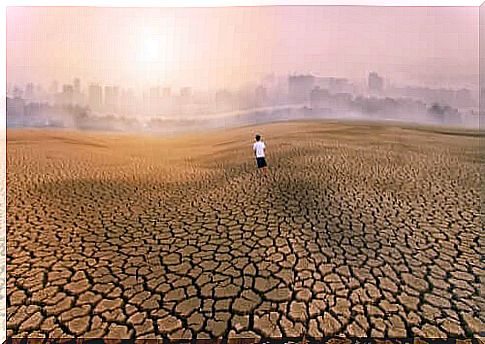Suffering From Climate Anxiety – A Consequence Of Climate Change

The climate crisis must be real, right? The poles are melting down, and millions of animal species are threatened as humans continuously change and destroy the world’s ecosystems, right? Thus, it is something completely normal and logical that those who really care about this may suffer from climate anxiety.
In addition, there are conflicts over the control of natural resources and concerns about their lack of resources. Worrying about this affects people in different ways, but it can be quite fundamental for some and thus affect their lives to a great extent. These people can probably be said to have suffered from climate anxiety.
This concept, in English called eco-anxiety, arises from the need for us to put a name to the chronic fear of environmental degradation. Concerns about climate change and its consequences for nature are definitely an additional source of stress that people can add to their daily worries.

Two possible reasons why you may suffer from climate anxiety
Climate anxiety occurs mainly for two reasons. On the one hand, it may be because you have had to leave your hometown due to climate change or disasters. On the other hand, it may be a consequence of having such an intense focus on the environment that it leads to mental discomfort.
The lost country
According to a report published by the European Union, approximately 26 million people are affected by meteorological disasters each year: floods, rain, fires or severe storms.
Thus, residents of certain areas are forced to emigrate due to said events. For example, one in ten people living on islands such as Tuvalu and Kiribati are forced to become climate refugees.
Due to these environmental changes, natural as well as those created by mankind, a large part of biodiversity is being eradicated and some places are running out of resources.
Therefore, it is becoming increasingly difficult and even impossible to live in these areas. It has become so serious that the United Nations estimates that about 1,500 million people will have to relocate to survive.
In addition to the changes that people go through when they have to change their place of residence, those who are forced to emigrate also suffer from the destruction of their country and environment. This can be a huge worry and frustration.
Climate anxiety is mainly due to a high environmental focus
People who are attached to and focused on nature become emotionally upset. This often comes with a sense of frustration due to the limited power of their individual actions. Thus, some people suffer to a very large extent from the effects that humans cause on the planet.
An example of this is the effect it has on young people. A clinical psychologist in Oxford has determined that many children have climate anxiety.
This is because children are more likely to believe and be convinced that humans are responsible for these climate changes. Therefore, they experience feelings as annoyance towards adults, because according to them they could have reduced the influence, frustration, fear and sadness.
In the same way, it is striking how environmental researchers are also greatly affected. To investigate this, Joe Duggan conducted a survey for researchers in 2014. The goal was to make them respond to how climate change made them feel.
The results showed more of the same. Many of them felt hopelessness, fear, despair and anxiety. In fact, British researchers recently published a letter in the journal Science. In this, they seek psychological help to better deal with the negative results of their studies.
Some consequences of suffering from climate anxiety
There are many consequences of climate change in addition to suffering from climate anxiety. With a focus on the psychological aspects, this influence can lead to physiological changes which in turn affect human well-being. Humans’ most basic physiological processes – such as sleeping and eating – are strongly influenced by nature.
Sunlight and temperature affect the circadian rhythm and regulate neurotransmitters that, for example, affect your health and mood. Therefore, radical changes in the environment jeopardize your body balance at all levels.
Natural disasters and high temperatures are also closely related to psychological disorders such as anxiety and mood disorders. For example, the rise in global temperatures has naturally already had consequences for the mental health of many.
Furthermore, research published by Nature shows that this increase plays a major role in the suicide rate. Another study reveals that pessimism increases when the temperature soars and you can read about this in the media.

What can you do?
It has the power to carry out the following three simple steps to reduce the problem and your own suffering:
- Think about climate change when deciding what to eat, how to travel and what and where to shop.
- Talk about climate change with your friends. You may not be able to change the world, but raising awareness within your immediate group can make a big difference.
- Be aware of what measures are being taken at the political level and what the parties involved are proposing and vote accordingly.
Experts recommend promoting resistance mechanisms when faced with this situation. No changes will take place if we do not take immediate action. In other words, we must understand the problem as a multidimensional element.
Thus, the best measure to reduce climate anxiety is to inform the public and give it empowerment. Every person must have the opportunity to be a part of the solution.
And finally, remember and find reassurance that in the history of mankind we have on several occasions experienced far warmer temperatures than is the case during this crisis, and we have adapted, even thrived, under them all.









